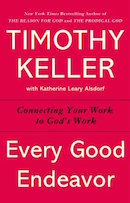The Gift of Gratitude
Blog / Produced by The High Calling
Fifteen years ago, Darren Lewis of Dallas had a comet by the tail: from a stellar high school football career, he graduated to a spectacular turn as a record-setting running back at one of Texas' best universities. From there, he bounded into a lucrative professional career. In the simple words of a college teammate, “He was magic.”
Leaving college, however, his magic began to run thin. Despite a positive drug test—a sad sign of things to come—he was drafted by the NFL and for three years played largely without distinction. Then he walked away into a purposeless decade that included drugs, thievery, and several arrests, most recently in Dallas in 2005.
“He’s got so many good people that love him. He's almost blind to it,” said his defense lawyer struggling to understand a great talent's breathtaking fall from NFL player to repeat criminal.
Most of our failures are, thankfully, less public. But like Darren Lewis, most of us at some time bear the brand of self-importance that takes talent for granted.
Running footballs or running companies, every talent comes to us as a gift. We give gifts to our children because we love them. Who selects and wraps a present expecting to see it used for self-destruction? Or hidden for fear of losing it? Or compared to someone else's gift and found wanting (or superior)? Or abused and discarded altogether?
Dick Bolles is author of the best-selling career-advice book What Color’s Your Parachute?, and he has an interesting handle on the idea of personal talent. In understanding what gift each person has received, he says our initial hope is to uncover whatever uniqueness makes us better than anyone else. What we discover is that “we are indeed special—but only because God thinks us so. Our specialness and uniqueness reside in Him and in His love rather than anything intrinsic to our own being. The proper appreciation of this distinction causes our feet to carry us in the end, not to the City called Pride, but to the Temple called Gratitude.”
Few people, in a state of genuine gratitude, are willing to waste their gifts.
Spud Webb was another Dallas athlete of Lewis’s generation. Spud played for 12 years in the NBA despite the fact that at 5’7” and 135 lbs, he was far smaller than most of his opponents. But Spud poured his heart into everything he had received. As he once put it, “I don’t play small. You have to go out and play with what you have.”
Leaving college, however, his magic began to run thin. Despite a positive drug test—a sad sign of things to come—he was drafted by the NFL and for three years played largely without distinction. Then he walked away into a purposeless decade that included drugs, thievery, and several arrests, most recently in Dallas in 2005.
“He’s got so many good people that love him. He's almost blind to it,” said his defense lawyer struggling to understand a great talent's breathtaking fall from NFL player to repeat criminal.
Most of our failures are, thankfully, less public. But like Darren Lewis, most of us at some time bear the brand of self-importance that takes talent for granted.
Running footballs or running companies, every talent comes to us as a gift. We give gifts to our children because we love them. Who selects and wraps a present expecting to see it used for self-destruction? Or hidden for fear of losing it? Or compared to someone else's gift and found wanting (or superior)? Or abused and discarded altogether?
Dick Bolles is author of the best-selling career-advice book What Color’s Your Parachute?, and he has an interesting handle on the idea of personal talent. In understanding what gift each person has received, he says our initial hope is to uncover whatever uniqueness makes us better than anyone else. What we discover is that “we are indeed special—but only because God thinks us so. Our specialness and uniqueness reside in Him and in His love rather than anything intrinsic to our own being. The proper appreciation of this distinction causes our feet to carry us in the end, not to the City called Pride, but to the Temple called Gratitude.”
Few people, in a state of genuine gratitude, are willing to waste their gifts.
Spud Webb was another Dallas athlete of Lewis’s generation. Spud played for 12 years in the NBA despite the fact that at 5’7” and 135 lbs, he was far smaller than most of his opponents. But Spud poured his heart into everything he had received. As he once put it, “I don’t play small. You have to go out and play with what you have.”





